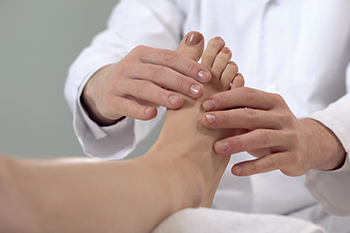Cracked Heels in Runners
Wednesday, 07 September 2022 00:00
Running is a cherished form of exercise that many people across the country engage in every day. However, if a runner is not careful, they may be at risk of developing certain foot conditions. For example, running can increase the risk of developing cracked heels. Also known as heel fissures, cracked heels occur when the skin on the back of the heel becomes significantly dry and hardened. The skin may even crack due to the lack of moisture. Running can lead to cracked heels because as an individual is running, they are repeatedly hitting their heels on hard surfaces. This pounding of the heel on the ground can lead to cracked heels. Although cracked heels may not always be a serious condition in runners, they can be unsightly and uncomfortable. If you are a runner, you may protect yourself from developing this condition by removing dead skin cells from your feet with a pumice stone. You might also choose to apply a heavy moisturizer to the heels to keep them from cracking. Contact a podiatrist for more tips and tricks about preventing cracked heels in runners.
Cracked heels are unsightly and can cause further damage to your shoes and feet. If you have any concerns, contact Dr. Anna Petrov from Family Foot & Ankle Care. Our doctor can provide the care you need to keep you pain-free and on your feet.
Cracked Heels
Cracked heels appear unappealing and can make it harder for you walk around in sandals. Aside from looking unpleasant, cracked heels can also tear stockings, socks, and wear out your shoes. There are several methods to help restore a cracked heel and prevent further damage.
How Do You Get Them?
Dry skin is the number one culprit in creating cracked heels. Many athletes, walkers, joggers, and even swimmers suffer from cracked heels. Age and skin oil production play a role to getting cracked heels as well.
Promote Healing
Over the counter medicines can help, especially for those that need instant relief or who suffer from chronic dry feet.
Wear Socks – Wearing socks with medicated creams helps lock in moisture.
Moisturizers – Applying both day and night will help alleviate dryness which causes cracking.
Pumice Stones – These exfoliate and remove dead skin, which allows for smoother moisturizer application and better absorption into the skin.
Change in Diet
Eating healthy with a well-balanced diet will give the skin a fresh and radiant look. Your body responds to the kinds of food you ingest. Omega-3 fatty acids and zinc supplements can also revitalize skin tissue.
Most importantly, seek professional help if unsure how to proceed in treating cracked heels. A podiatrist will help you with any questions or information needed.
If you have any questions, please feel free to contact one of our offices located in Wheeling and Chicago, IL . We offer the newest diagnostic and treatment technologies for all your foot care needs.







